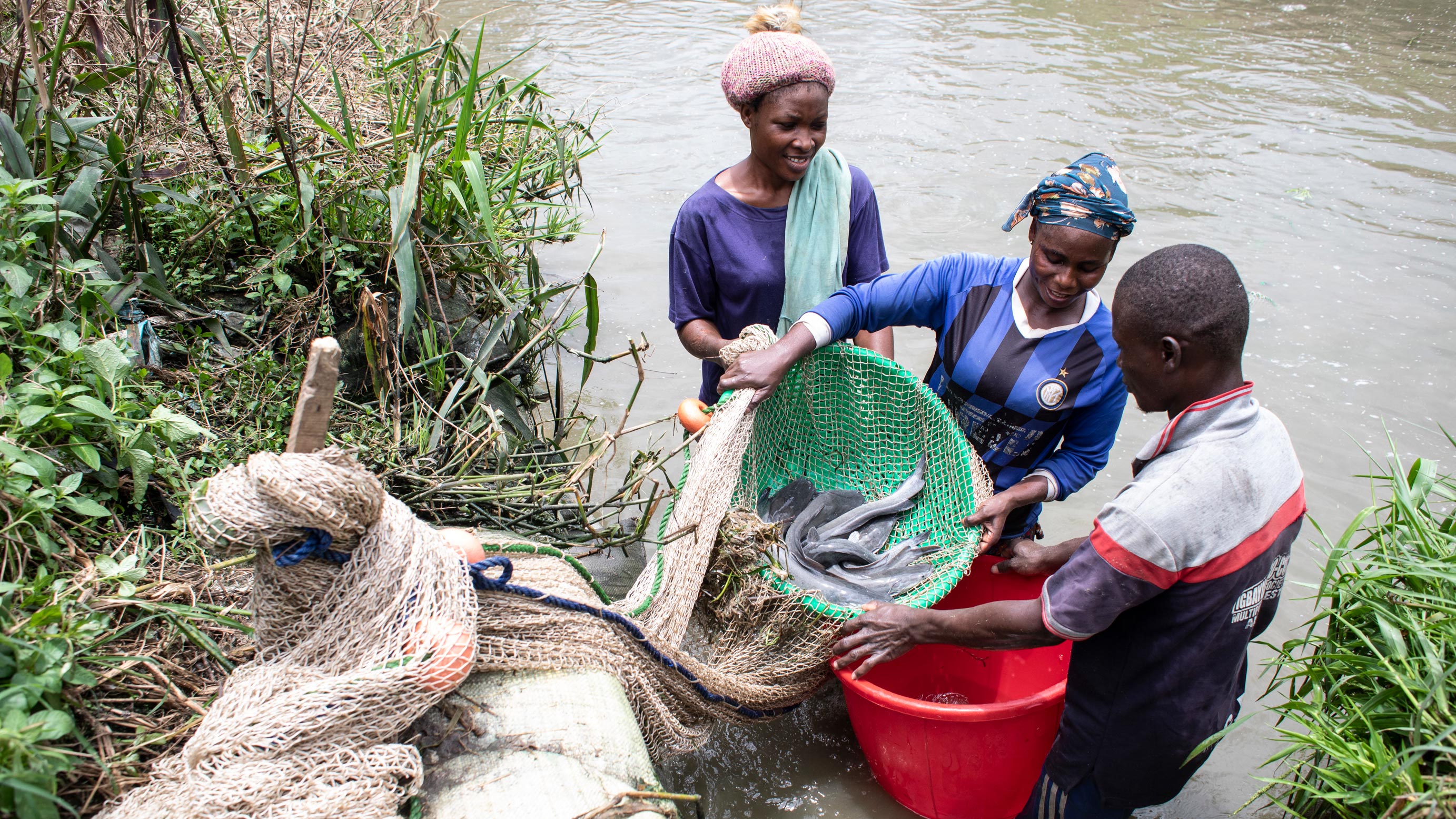Catfish: a big business for a big nation

“Fish farming is my mother’s business,” says Nurudeen Quadri, a 38-year-old fish farmer from Ijebu-Ode in southwest Nigeria as he enters Eriwe farm village. “I have been coming here since I was very small. When I graduated from university, I started my own farm.”
Located at two hours’ drive east of Lagos, Nigeria’s sprawling business capital, Eriwe farm village is the site of one of the countries’ biggest catfish clusters. Along the banks of a little river lie the ponds of nearly 600 fish farmers, organized in cooperatives as part of the Eriwe fishers’ union. These farmers produced some 2 000 tonnes of catfish in 2022.
It is seven o’clock in the morning, when Nurudeen’s two workers switch on the water pumps and fresh water starts pouring into the fish ponds. “It gives the fish oxygen to open their appetite before they are fed in the afternoon,” Nurudeen says.
With the workers, he does maintenance and repairs in and around the ten ponds of his farm, two of which are used for rearing fingerlings. During harvest time, they sell the fish.
Nurudeen produces nearly 50 tonnes of catfish per year. Despite the rising cost of feed and limited access to finance, this work allows him to sustain himself and his family.“I can make a good living out of it,” he says.
Mary Stephens and her husband also have a few ponds in Eriwe farm village. But their main business is fish processing. The racks that line the yard of their facility are filled with slices of catfish, sizzling as they are slowly smoked by the charcoal that can be seen glowing underneath.
“There are about 150 basins of catfish on the fire now,” Mary says, or some 3 750 kilograms. She adds that most of them come from Eriwe farm. The smoked catfish will be sold at the market in Onitsha, some 300 kilometres to the east. “People, even from abroad, come there and buy our goods.”
Capital is the major challenge, says Mary, who has been in this business for 25 years. She hopes to get a machine to replace some of their manual work. She smiles: “Equipment and capital. If all those things are ready, the business will go.”
FISH4ACP, a global fish value chain development programme in partnership between FAO, the EU, BMZ and the OACPS, is helping Nigeria to make its catfish sector stronger. Together with Nigeria’s Federal Ministry of Agriculture and Food Security, it carried out an analysis of Nigeria’s catfish sector.
The analysis showed the sectors’ importance for people’s livelihoods. Nigeria counts an estimated 285 000 catfish producers, 60 percent of which are small-scale farmers. These businesses employ an estimated one million people.
“Catfish is a good business,” says Abubakar Usman, an FAO expert in Nigeria’s catfish sector and lead for the FISH4ACP programme in the country. Demand for fish is huge. With over 223 million people, Nigeria is Africa’s most populous nation, and fish makes up over 40 percent of people’s animal protein intake, of which at least one-quarter is catfish.
According to preliminary findings of FISH4ACP’s analysis, annual catfish production could be as high as one million tonnes in 2021, worth around USD 2.6 billion, says Usman.
A top priority for the FISH4ACP programme is to bring costs down in Nigeria’s catfish sector. The initiative is additionally working on credit schemes to help farmers finance their operations. ©FAO/Giulio Napolitano
Catfish started booming in the 1990s, says Usman, when the government established hatcheries for catfish fingerlings and seed became available. Years of annual growth at over 20 percent followed between 2005 and 2015 before catfish production started declining in 2016, mainly due to rising feed prices.
At the top of FISH4ACP’s priorities to strengthen Nigeria’s catfish sector is to bring costs down. At the same time, the initiative is working on a feed credit scheme to help farmers finance their operations before the money comes in at harvest time.
There are concerns about sustainability too. Traditional fish smoking can affect human health, while the use of firewood contributes to deforestation. FISH4ACP is supporting the introduction of innovative smoking kilns that use less wood and reduce people’s exposure to smoke.
It’s late afternoon when Nurudeen, waiting for his turn to join the daily football match of fish farmers and workers, reflects on ways to grow his business. The good thing about Eriwe farm village is that farmers work together to make things better, he says.
The farmers of Eriwe want to go into fish processing, and they are restricting intermediaries from entering the farm so they can negotiate prices directly with buyers. “We are telling people that catfish is not only for rich people. It’s for everybody,” Nurudeen says. “The more they consume, the bigger the demand.”
FISH4ACP can make a difference by working with clusters like Eriwe farm village, says Usman. Together, the programme and cooperatives have the capacity to rise up to the challenge of making Nigeria’s catfish sector more resilient, efficient and environmentally friendly. “If you touch the lives of fish farmers here, the whole country can follow.”
Just before entering the football pitch, Nurudeen says: “I like fish farming. It gives you a bright future and lets you give back to the society, because invariably you are feeding the nation.”
